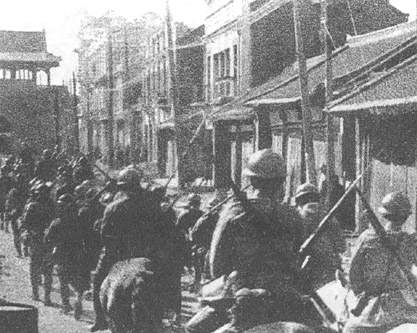Manchuria 1931
Why did Japan invade Manchuria?
Japan suffered greatly as a result of the 1929 Great Depression. The government struggled to deal with the crisis and appeared feeble. The army was admired by many people who craved a more muscular response to Japan's woes.
Senior army figures felt that a campaign to extend Japan's empire would solve Japan's burgeoning economic problems and Manchuria was an obvious target. With nearly 200,000 square kilometres, it would provide ample space to accommodate Japan's over-flowing population. Manchuria was also rich in natural resources, forests and fertile farmland. Some Japanese people even saw the Chinese as an inferior race, and therefore felt little sympathy with the inhabitants of Manchuria.

How did the invasion happen?
Japan had a strong economic presence in Manchuria. It had heavily invested money in the Manchurian economy and had control of the South Manchuria Railway Company. Japanese troops were stationed in Manchuria to guard the railway.
In September 1931, there was a small explosion on a railway line near Mukden (now Shenyang). The army promptly blamed local saboteurs and occupied Mukden. It is now widely acknowledged that the Japanese army staged this explosion to provide Japan with an excuse to invade.
At China's request, the League of Nations demanded that the army withdraw at once. Both the government of Japan and their League of Nations delegates appeared to agree to this order; the later even blamed the incident on military 'hot-heads'. But the army paid no attention and by the end of 1931 it had invaded the whole of Manchuria and re-named it Manchukuo. In March 1932 they set up a puppet government to preside over the province.
How did the League of Nations respond?
The League of Nations failed to impose economic sanctions on Japan. In the midst of the Depression, nations did not want to risk losing valuable trade with Japan. Anyway, the United States and the USSR, as non-League members, would have continued trading with Japan and rendered the sanctions relatively painless. British politicians were also reluctant to aggravate Japan. They had prized colonies in the Far East – including Hong Kong and Singapore – and feared the fate that would befall these territories if Japan retaliated.
Instead, the League set up a Commission of Inquiry, headed by Lord Lytton. This group visited Manchuria, and took almost a year (until October 1932) to conclude that Japanese soldiers should withdraw from Manchuria. In response to the report, in February 1933, a motion was raised in the General Assembly of the League of Nations to censure Japan as an aggressor.
In response to the rebuke, Japan revoked their League membership. That year the Japanese army made further incursions into China and occupied the Jehol region. This presaged Japan’s full invasion of China in 1937.
What did the Manchuria crisis mean for the League of Nations?
The League had lost its most influential member in the Far East. Japan eventually allied itself with two countries who also transgressed League rules – Germany and Italy.
The League had showed that it was all bark and no bite. It failed to make any military or economic interventions, and Japan could simply ignore its stern warnings. When these warnings became more robust after the Lytton Commission, Japan walked out of the League itself. Japan's flagrant aggression had been met by complete ineffectiveness. With this precedent, the League of Nations' value as a deterrent against bellicose countries was considerably weakened. The episode signalled to other nations that they too could get away with the use of force.
See also: Abyssinia 1935
MLA Citation/Reference
"Manchuria 1931". HistoryLearning.com. 2026. Web.
